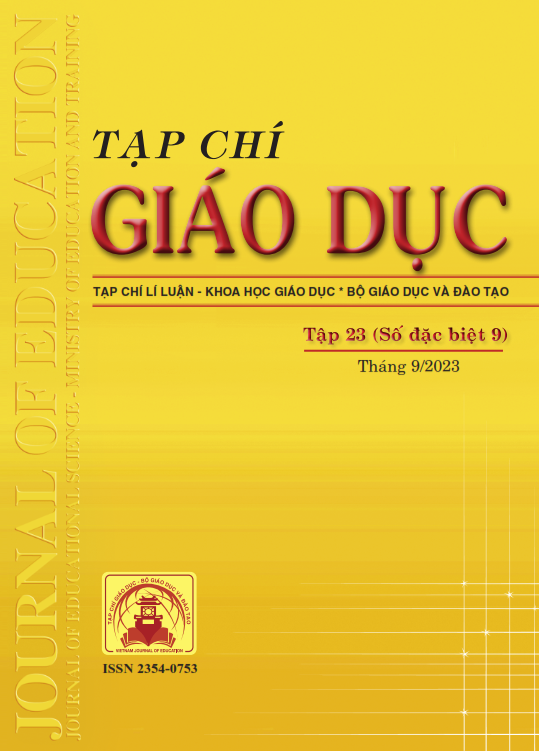Giáo dục 4.0 và những hoạt động chuyển đổi số trong giáo dục
Tóm tắt
Amidst the rapid and robust transformations brought about by the industrial revolution, digital transformation stands out as the most pivotal endeavor, commanding exceptional attention. Digital transformation in education integrates the achievements of the FIR to revolutionize the entire educational system and its components. This digital shift enhances the effectiveness of education, promptly meeting the demands for human resources in this new context. Digital transformation within the realm of education brings about substantial changes across the spectrum, from the foundational infrastructure to macro-level stakeholders like educational administrators and policymakers, down to micro-level participants such as teachers and students. In this article, we delve into the global and Vietnamese dimensions of digital transformation, the achievements of this transformative journey, Education 4.0, its core constituents, digital transformation within education, its implications for leadership and its implications for both educators and learners. The research methodology employed herein adopts a theoretical research approach, allowing for an in-depth analysis of factors intertwined with Education 4.0 and the digital transformation activities within education.
Tài liệu tham khảo
Asghar, S., Rextina, G., Ahmed, T., & Tamimy, M. I. (2020). The Fourth Industrial Revolution in the developing nations: Challenges and road map (No. 102). Research Paper.
Bahrin, M. A. K., Othman, M. F., Azli, N. N., & Talib, M. F. (2016). Industry 4.0: A review on industrial automation & robotic. Jurnal Teknologi, 78(6-13), 137-143.
Beyer, M. A., & Laney, D. (2012). The importance of “big data”: a definition. Stamford, CT: Gartner, 2014-2018.
Caruso, L. (2018). Digital innovation & the fourth industrial revolution: epochal social changes?. AI & Soc, 33, 379-392. https://doi.org/10.1007/s00146-017-0736-1
Dao, T. L., Tran, T., Le, H. V., Nguyen, N. G., & Trinh, T. P. T. (2022). A bibliometric analysis of Research on Education 4.0 during the 2017-2021 period. Education & Information Technologies, ISSN 13602357, 18 August 2022. https://doi.org/10.1007/s10639-022-11211-4.
Đào Thái Lai, Nguyễn Ngọc Giang, Lê Văn Hồng, Nguyễn Thị Quốc Hòa, Phạm Thanh Tâm, Nguyễn Bạch Yến (2023). Xây dựng sách điện tử tương tác trong bối cảnh Giáo dục 4.0. NXB Khoa học kĩ thuật.
Degryse, C, (2016). Digitalisation of the economy & its impact on labor markets. Working paper 2016.02, Brussels, ETUI.
Dilberoglu, U.M., Gharehpapagh, B., Yaman, U., & Dolen, M. (2017). The role of additive manufacturing in the era of industry 4.0. Procedia Manufacturing, 11, 545-554.
Ford, S. & M. Despeisse (2016). Additive manufacturing & sustainability: an exploratory study of the advantages & challenges. Journal of Cleaner Production, 137, 1573-1587.
Lee, J., Bagheri, B., & Kao, H. A. (2015). A cyber-physical systems architecture for industry 4.0-based manufacturing systems. Manufacturing Letters, 3, 18-23
Madakam, S., Ramaswamy, R., & Tripathi, S. (2015). Internet of Things (IoT): A literature review. Journal of Computer & Communications, 3(05), 164.
Mell, P. & Grance, T. (2011). The NIST definition of cloud computing.
Ooi, K. B., Lee, V. H., Tan, G. W. H., Hew, T. S., & Hew, J. J. (2018). Cloud computing in manufacturing: The next industrial revolution in Malaysia?. Expert Systems with Applications, 93, 376-394.
Paelke, V. (2014). Augmented reality in the smart factory: Supporting workers in an industry 4.0. environment. In Proceedings of the 2014 IEEE emerging technology & factory automation (ETFA),1-4.
Rajkumar, R., Lee, I., Sha, L., & Stankovic, J. (2010). Cyber-physical systems: the next computing revolution. In Design Automation Conference. IEEE, 731-736.
Rüßmann, M., Lorenz, M., Gerbert, P., Waldner, M., Justus, J., Engel, P., & Harnisch, M. (2015). Industry 4.0: The future of productivity & growth in manufacturing industries. Boston Consulting Group, 9(1), 54-89.
Strange, R. & Zucchella, A. (2017). Industry 4.0, global value chains & international
business. Multinational Business Review, 25(3), 174-184.
Thompson, M. K., Moroni, G., Vaneker, T., Fadel, G., Campbell, R. I., Gibson, I., Bernard, A., Schulz, J., Graf, P., Ahuja, B., & Martina, F. (2016). Design for Additive Manufacturing: Trends, opportunities, considerations, & constraints. CIRP annals, 65(2), 737-760.
Vaidya, S., Ambad. P, & Bhosle, S. (2018). Industry 4.0-a glimpse. Procedia Manufacturing, 20, 233-238.
Valenduc, G., & Vendramin, P. (2016). Working in the digital economy: sorting the old from the new. Working Paper 2016.3, European Trade Union Institute.
Wang, S., Wan, J., Li, D., & Zhang, C. (2016). Implementing smart factory of industrie 4.0: an outlook. International Journal of Distributed Sensor Networks.
Ward, J. S. & Barker, A. (2013). Undefined by data: a survey of big data definitions. arXiv preprint arXiv:1309.5821.
Zhang, Q., Cheng. L., & Boutaba, R. (2010). Cloud computing: state-of-the-art & research challenges. Journal of Internet Services & Applications, 1(1), 7-18.
Zhong, R. Y., Xu. X., Klotz. E., & Newman, S. T. (2017). Intelligent manufacturing in the context of industry 4.0: a review. Engineering, 3(5), 616-630.
Zhou, K., Liu, T. & Zhou, L. (2015). Industry 4.0: Towards future industrial opportunities & challenges. In 2015 12th International conference on fuzzy systems & knowledge discovery (FSKD), 2147-2152.
Đã Xuất bản
Cách trích dẫn
Số
Chuyên mục
Giấy phép

Tác phẩm này được cấp phép theo Ghi nhận tác giả của Creative Commons Giấy phép quốc tế 4.0 .












